LOCH LOMOND, Scotland — We weren’t around to witness its invention, but we’d hazard a guess that a tool like the axe was invented awfully early in humanity’s history. Sharp edge, brute force, blammo. While Land Rover may have been predated by the seminal military jeep, like the axe, it too was a simple tool designed specifically for one purpose: off-road mastery. Fast forward a lifetime or so and you’ll meet us where we’re standing today as we open the driver’s door of the Ineos Grenadier.
It’s hard not to mention the Land Rover Defender when describing the Ineos Grenadier, but the new machine is most certainly not a copy of the old. If you were asked to picture a boxy, off-road utility vehicle, chances are you’d draw up something shaped along the same straight lines, but you could be thinking of any number of classic Jeep, Landie, Mercedes-Benz or Toyota designs.
Ineos was formed by Sir Jim Ratcliffe in 1992 and today is the fourth largest chemical company in the world. Ineos Automotive was founded in 2017 with the intent to build a proper off-road vehicle in the same mold as the deceased Land Rover Defender (the original, not the reborn model).
With its permanent four-wheel-drive system, three available locking differentials, a two-speed transfer case, solid front and rear axles, and a grunty engine, the Grenadier does more than look similar to those legendary off-roaders, it off-roads like them, too. More traditional bits include a full ladder frame and an old-school recirculating ball steering box. But dismissing the Ineos Grenadier as merely an anachronism that doesn’t belong on today’s roads isn’t accurate, either. Ineos sources its engines from BMW — the U.S. model will be sold solely with a B58 gasoline-fueled 3.0-liter straight-six producing around 283(ish) horsepower and 330(ish) pound-feet of torque — eight-speed automatic transmission from ZF, transfer case from Tremec, axles from Carraro, differential lockers from Eaton, progressive-rate springs from Eibach and brakes from Brembo. It all adds up to a suitably sturdy platform, a modern take on historically durable componentry.
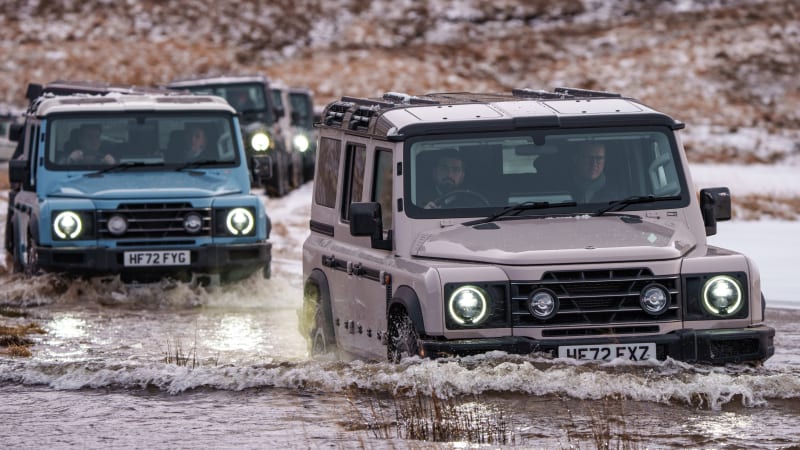
Off-road, the Ineos Grenadier is capable of traversing just about any terrain that’s passable on four wheels. We pointed its stubby front end at all the usual suspects during one leg of a grand expedition through the rugged Scottish countryside: boulder-strewn mountains, deeply rutted and muddy crests, small water crossings, the sandy shores of an iced-over lake. There’s a too-complicated process of locking the differentials and engaging Off-Road mode, but once accomplished, the Grenadier’s capabilities are as expected and certainly comparable with any of the rest of the world’s off-road icons, including those from the likes of Jeep and Land Rover.
The Grenadier boasts 10.4 inches of ground clearance, an approach angle of 35.5 degrees and a departure angle of 36.1. The breakover is listed at 28.2 degrees, and Ineos says the Grenadier can tilt on its side up to 45 degrees. The five-link suspension setup and solid axles front and rear delivers 9 degrees of articulation at the front and 12 at the rear, and total wheel travel is listed at 23 inches. Those figures are soundly superior to the Mercedes G 550. Compared to a Jeep Wrangler Unlimited Rubicon, the Grenadier is lacking in the approach and departure angles and has about half an inch less ground clearance but is a bit better on breakover.
The engine’s torque curve is tuned flat, with its peak delivered between 1,750 to 4,000 rpm. The 2.5:1 low-range calculates out to a crawl ratio of 53.81, or a very manageable 1.26 mph. On the flip side of the hill, Downhill Assist automatically keeps the Grenadier to a set speed as low as 2 mph, selectable through the cruise control buttons.
The Grenadier is larger in every exterior dimension than a Jeep Wrangler Unlimited, but its 115.0-inch wheelbase is 3.4 inches shorter than the Jeep’s and its high-up seating position and flat fenders make it easy to place its 265/70R17 or optional 255/70R18 front tires right where you want them. Two tires are offered: a custom Bridgestone Dueler A/T offers a good street/dirt compromise while BFGoodrich K02s would be the more natural choice given their solid reputation from overlanders.
Globally, three trim levels are offered for the Grenadier, all of them using the same powertrain. There’s a base model that comes standard with a center locking differential, an off-road focused Trailmaster that gets all the extra off-road kit standard (including a snorkel air intake), and a fancier Fieldmaster model that gets standard heated seats wearing leather in gray or black. We’re not yet certain what will come standard or be made optional for the U.S. market, but we’re hoping the Belstaff-branding is left intact (Ineos owns the well-known English clothier).
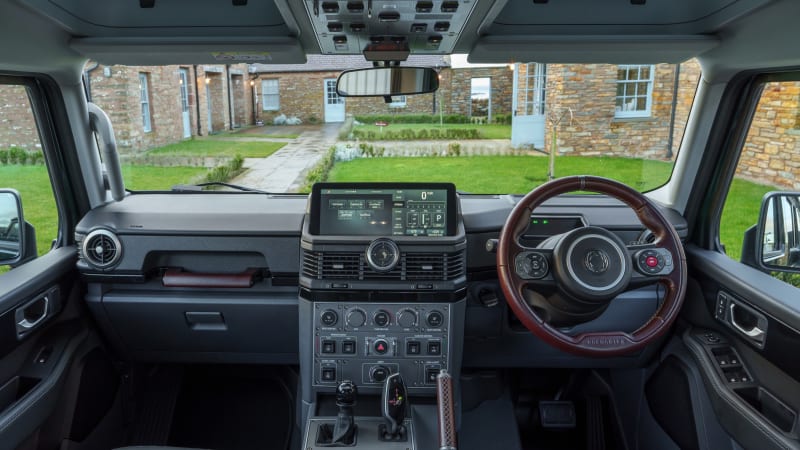
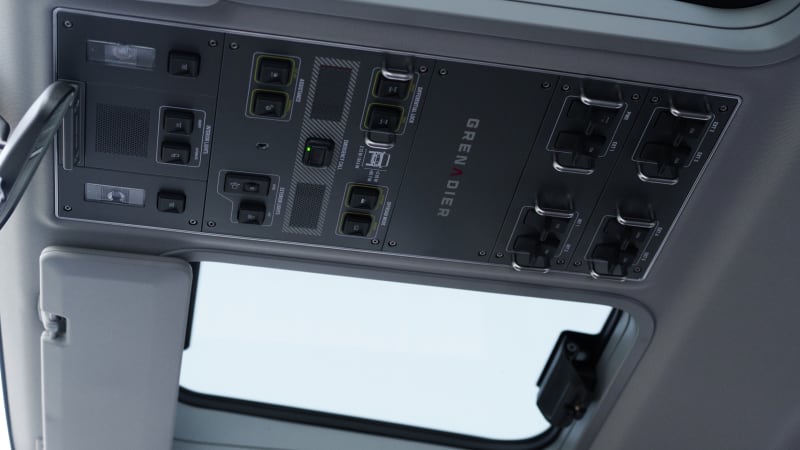
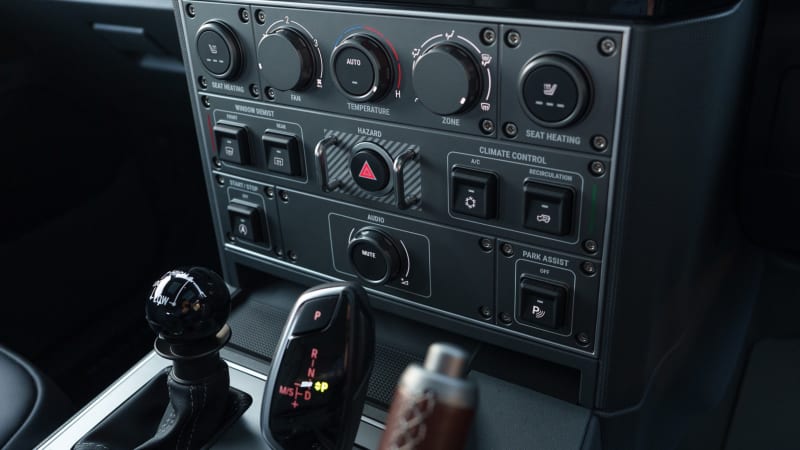
As much as we love driving through the muck, the reality is that many more miles will pass beneath the tire of nearly any Grenadier on tarmac. Fortunately, this off-roader is pretty adept at on-road driving, too. The old-fashioned recirculating-ball steering has a slow ratio with 3.85 turns lock to lock, and it doesn’t naturally want to return easily to center at low speeds. The steering gets more precise and gains a bit of feel as speeds rise, and the chassis is playful and communicative enough that it’s not a chore to drive on twisty roads at speed.
Besides the lack of low-speed steering feel and considering the Grenadier’s mission statement, we don’t have many other complaints. The suspension is compliant and the engine offers a reasonable amount of grunt. Though the claimed 0-60 time of a couple ticks past 8 seconds won’t win many drag races — especially lined up against a similarly box-shaped off-roader wearing the letter G — in reality it’s plenty quick enough for a sturdy ute. We don’t have EPA fuel mileage ratings, but we’d expect something in the 20-mpg ballpark in mixed driving.
The Grenadier’s interior furnishings are a compromise between utility, functionality and muted luxury. Cloth seats sourced from Recaro are standard along with rubber flooring surfaces, but leather and carpeting can be optioned. The interior is surprisingly quiet, with engine, road and wind noise low enough to carry on an easy conversation. Credit BMW’s inherently smooth inline-six engine and ZF’s unflappable automatic gearbox for much of the Grenadier’s refinement. Drivers of right-hand-drive Grenadier models face an unfortunate floor intrusion where their left feet will naturally sit, but no such issue exists on left-hand-drive models destined for America.
There’s no gauge cluster directly in front of the driver, only some warning lights and indicators. Instead, nearly all information is delivered on a centrally located 12.3-inch screen. The speedometer and all other readouts are laid out sensibly on the screen, though it’s always our preference to have real dials directly in front of the driver. The infotainment system wears a custom interface designed by Ineos, and various screens and settings can be accessed or scrolled through via the touch-sensitive panel itself or a iDrive-esque rotary controller. Real dials and buttons beneath the screen for the climate and audio controls are a welcome sight, and the layout and size means they are commendably easy to operate.
Keep moving upward to the roof and you’ll find another large control panel that houses all the off-road-specific toggles and switchgear. It looks complicated at a glance, and its mixture of button pressing and switching procedures is needlessly fiddly, but a few off-roading trips ought to make them second nature.
An off-road niggle quickly became apparent while testing the Grenadier. Instead of fitting a separate sensor inside the axle to confirm whether it’s locked or not, engineers instead decided to perform the detection using the wheel speed sensors that were already there. That means the car’s electronic brain doesn’t know you’ve unlocked a differential until it detects wheel slippage. Usually that’s not a big deal, but some off-road settings are only accessible with the diffs locked or unlocked, which sometimes leads to a game of to-and-fro throttling through the mud and rocks so the system would confirm its status. We’re hoping software updates can fix some of these early issues.
We’re particularly fond of the Grenadier’s optional Safari windows positioned above the driver and passenger seats. While not as airy as a Wrangler or Bronco’s fully removable top, an easy latch system pops either hatch open, and a further press pushes them completely out. We’d love more vintage-looking skylights along the sides, but Ineos instead chose to package various mounting points along the roof instead. The rear cargo area is accessible from a pair of swinging doors, the smaller 1/3rd-width door optionally holding steps to the roof. Another unusual feature are the optional attachment strips along the car’s beltline that can be fitted with all manner of aftermarket accessories like extra fuel cans and flip-down tables.
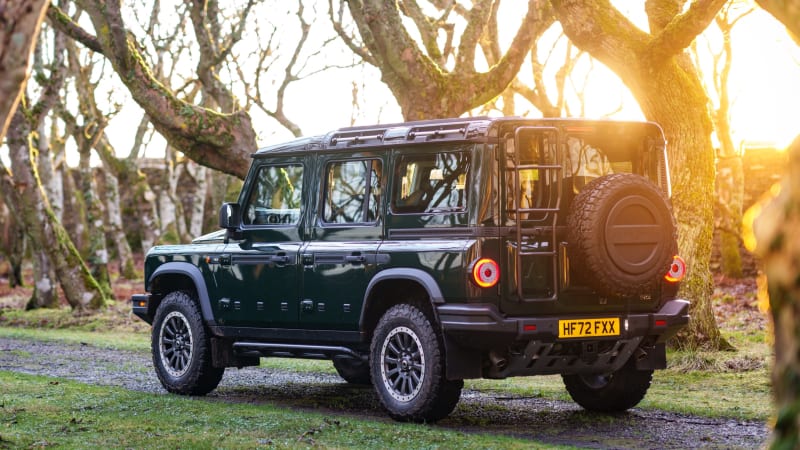
We expect there’s a large potential pool of customers for this kind of vehicle, so long as it’s priced fairly. We’ll have to wait a few more months before Ineos is ready to divulge pricing and its availability plan for the U.S. market, so we unfortunately have to reserve final judgment on that topic. But we’re very intrigued by the vehicle cooked up by the boffins at Ineos (with plenty of welcome assistance from Magna-Steyr). The Grenadier will look right at home everywhere from atop the rocks of Moab to buried-to-its-wheel-arches in mud in a Southern swamp, with a few stops in Hollywood and Miami along the way.
The Ineos Grenadier is a throwback vehicle designed to appeal to buyers who have grown tired of the complexity of modern off-road vehicles. You could say the Grenadier operates in the space between the old Land Rover Defender and the new one. It boasts the modern necessities a safe, reliable car has to have in today’s world while eschewing anything deemed unnecessary, including height-adjustable suspension, disengaging swaybars or terrain management software. Put another way, it’s a wooden-handled axe in a world full of shiny chainsaws. Sometimes, brute force is the way to go.
